Category: Non-Fiction
- Home
- /
- Shop
- /
- By Grade
- /
- 9th-12th
- /
- Language Arts
- /
- Reading
- /
- Literature
- /
- Non-Fiction
Showing all 15 resultsSorted by latest
-
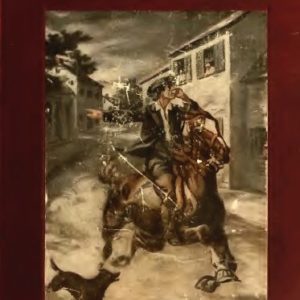 $2.50Buy Now
$2.50Buy NowExcerpt from Paul Revere: The Torch Bearer of the Revolution
It has been Wisely said that Time must lay a finger on events to make them into history. The further away we stand from certain pictures, the more distinct they appear. The events we read of in today’s newspaper are not history, but twenty years, or fifty, or a century hence, our descendants will pore over the musty, dusty files, and history will be born.Paul Revere never imagined that he was living in an epoch – making period; yet the story of his eventful life holds a fascination of its own, appealing strongly to the interest of readers, old and young. He stood for so much in the history of our country in those stirring Revolutionary times, that we cannot lightly pass over the many services he rendered to the cause of Liberty.
-
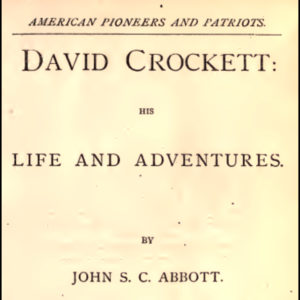 $2.50Buy Now
$2.50Buy NowDavid “Davy” Crockett (August 17, 1786 – March 6, 1836) was a 19th-century American folk hero, frontiersman, soldier, and politician. He is commonly referred to in popular culture by the epithet “King of the Wild Frontier”.
-
 $3.00Buy Now
$3.00Buy NowThis is a downloadable copy of the book.
About the book: Barton’s 1904 book “A Story of the Red Cross: Glimpses of Field Work,” recounts the work performed by the Society under her direction.About the Author: Clara Barton (1821 – 1912) was a pioneering nurse who founded the American Red Cross. She was a hospital nurse in the American Civil War, a teacher, and patent clerk. Nursing education was not very formalized at that time and Clara did not attend nursing school, so she provided self-taught nursing care.
-
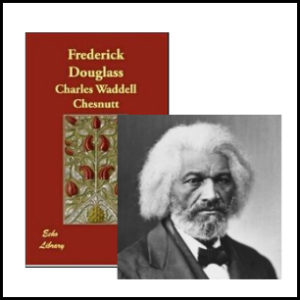 $2.50Buy Now
$2.50Buy NowThis 42 page book is a biography of Frederick Douglass. Frederick Douglass was an American social reformer, abolitionist, orator, writer, and statesman. After escaping from slavery in Maryland, he became a national leader of the abolitionist movement in Massachusetts and New York, gaining note for his oratory and incisive antislavery writings.
-
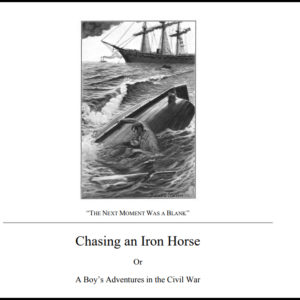 $2.50Buy Now
$2.50Buy NowStory-line: The story is about an adolescent drummer boy named George Knight and his dog Waggie during the Civil War. Together this pair joins a group of Union soldiers who make their way deep into southern territory, as spies, to overtake and steal a train. Their intent is to drive the train north, burning railroad bridges on their way back to their own lines. The story addresses courage, honor, dignity between combatants, and ends with a nation re-united.Written in 1902.
It is based on a true story, that journalizes the penetration, techniques of survival, attack, escape and evasion, and the complete details of the raid. (Suggested for 7th-12th Grades)
-
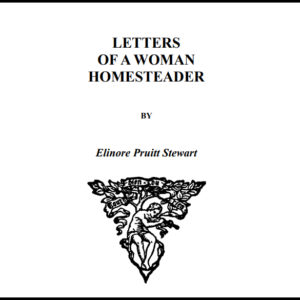 $2.00Buy Now
$2.00Buy NowThis is a downloadable copy of the book.
About the book: The writer of the following letters which comprise this book is a young woman who lost her husband in a railroad accident and went to Denver to seek support for herself and her two-year-old daughter, Jerrine. Turning her hand to the nearest work, she went out by the day to work as a house cleaner and laundress. Later, seeking to better herself, she accepted employment as a housekeeper for a well-to-do Scottish cattleman, Mr. Stewart, who had taken up a quarter-section in Wyoming. The letters, written through several years to a former employer in Denver, tell of her new life in the new country. They are genuine letters, and are printed as written, except for occasional omissions and alterations of names. The letters begin in 1909, apparently right after a homestead act made it possible for the author, Elinore Pruitt Stewart, to claim a homestead of 160 acres in Wyoming. Ms. Stewart is a very resourceful woman as well as a wonderful story-teller. -
 $2.00Buy Now
$2.00Buy NowThis is a downloadable copy of the book. (133 pages)
About the book: First published in 1905, the book begins: “As life broadens with advancing culture, and people are able to appropriate to themselves more of the various forms of art, the artist himself attains to greater power, his abilities increase in direct ratio with the progress in culture made by the people and their ability to comprehend him. When one side or phase of an art comes to be received, new and more difficult problems are invariably presented, the elucidation of which can only be effected by a higher development of the faculties. There is never an approach to equilibrium between the artist and his public. As it advances in knowledge of his art, he maintains the want of balance, the disproportion that always exists between the genius and the ordinary man, by rising ever to greater heights. If Bach is the mathematician of music, as has been asserted, Beethoven is its philosopher. In his work the philosophic spirit comes to the fore. To the genius of the musician is added in Beethoven a wide mental grasp, an altruistic spirit, that seeks to help humanity on the upward path. He addresses the intellect of mankind.” According to Wikipedia: “Ludwig van Beethoven (16 December 1770 – 26 March 1827) was a German composer and pianist. He was a crucial figure in the transitional period between the Classical and Romantic eras in Western classical music, and remains one of the most acclaimed and influential composers of all time.” -
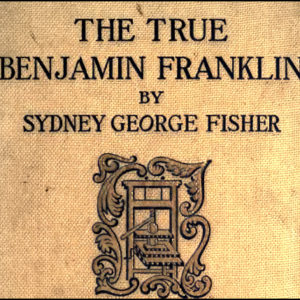 $3.50Buy Now
$3.50Buy NowThis is a downloadable copy of the book. (442 page download)
About the book: Benjamin Franklin excelled in the roles of diplomat, postmaster, political theorist, scientist, satirist, and musician, and yet we still know so little about his life. Fellow Philadelphian George Fisher wrote this biography in 1898—illustrated here with black and white images throughout—and it depicts a Ben Franklin not seen in other portraits of the man. Following him from his boyhood, when he first wrote articles for his brother’s Boston paper, to his years as a statesman and inventor, Fisher also deals with Franklin’s political intrigues with the British and French, as well as his illegitimate children, offering a unique perspective of this most fascinating American figure. -
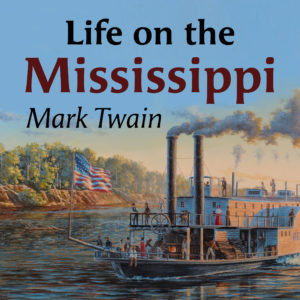 $3.00Buy Now
$3.00Buy NowThis is a downloadable copy of the book. (558 pages)
About the book: Life on the Mississippi, memoir of the steamboat era on the Mississippi River before the American Civil War by Mark Twain, published in 1883.The book begins with a brief history of the river from its discovery by Hernando de Soto in 1541. Chapters 4–22 describe Twain’s career as a Mississippi steamboat pilot, the fulfillment of a childhood dream. The second half of Life on the Mississippi tells of Twain’s return, many years after, to travel the river from St. Louis to New Orleans. By then the competition from railroads had made steamboats passé, in spite of improvements in navigation and boat construction. Twain observes new, large cities on the river
-
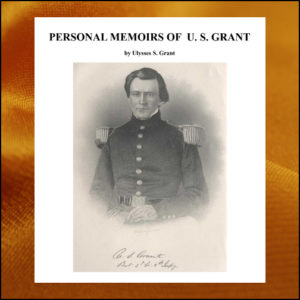 $3.00Buy Now
$3.00Buy NowThis is a downloadable copy of the book. (548 pages)
About the book: Completed just days before his death and hailed by Mark Twain as “the most remarkable work of its kind since the Commentaries of Julius Caesar,” this is the now-legendary autobiography of ULYSSES SIMPSON GRANT (1822-1885), 18th president of the United States and the Union general who led the North to victory in the Civil War. Though Grant opens with tales of his boyhood, his education at West Point, and his early military career in the Mexican-American war of the 1840s, it is Grant’s intimate observations on the conduct of the Civil War, which make up the bulk of the work, that have made this required reading for history students, military strategists, and Civil War buffs alike. This unabridged edition features all the material that was originally published in two volumes in 1885 and 1886, including maps, illustrations, and the text of Grant’s July 1865 report to Washington on the state of the armies under his command. -
 $3.00Buy Now
$3.00Buy NowThis is a downloadable copy of the book. (Large download – 527 pages)
About the book: With Helen Keller’s Letters (1887-1901) and a Supplementary Account of Her Education, Including Passages From the Reports and Letters of Her Teacher, Anne Mansfield Sullivan -
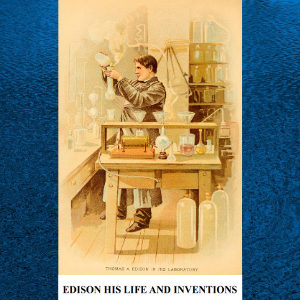 $3.00Buy Now
$3.00Buy NowThis is a downloadable copy of the book. (427 pages)
About the book: Thomas Alva Edison (February 11, 1847 – October 18, 1931) was an American inventor, scientist, and businessman who developed many devices that greatly influenced life around the world, including the phonograph, the motion picture camera, the stock ticker, electric power, recorded music, the mechanical vote recorder and the light bulb, among many others. This biography discusses many facets of Edison’s life such as his boyhood years in Port Huron, Michigan, his time as a young telegraph operator, his time working and inventing in Boston, his inventing of the stock ticker, the phonograph, the telephone, the microphone, and the light bulb. You will learn of his world wide search for a supply of filament, and many details of his life not covered in other works of his life. -
 $2.50Buy Now
$2.50Buy NowThis is a downloadable copy of the book. (55 pages)
About the book: Out of print for over a century, The World I Live In is Helen Keller’s most personal and intellectually adventurous work—one that transforms our appreciation of her extraordinary achievements. Here this preternaturally gifted deaf and blind young woman closely describes her sensations and the workings of her imagination, while making the pro-vocative argument that the whole spectrum of the senses lies open to her through the medium of language. Standing in the line of the works of Emerson and Thoreau, The World I Live In is a profoundly suggestive exercise in self-invention, and a true, rediscovered classic of American literature. -
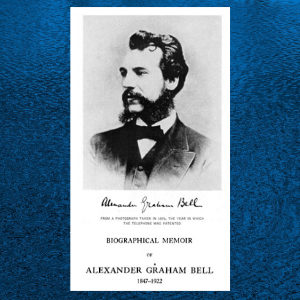 $2.00Buy Now
$2.00Buy NowThis is a downloadable copy of the book. (30 pages)
Excerpt from the book: Alexander Graham Bell – teacher, scientist, inventor, gentleman – was one whose life was devoted to the benefit of mankind with unusual success. Known throughout the world as the inventor of the telephone, he also made other inventions and scientific discovers of first importance, greatly advanced the methods and practices for teach the deaf and came to be admired and loved throughout the world for his accuracy of thought and expression.
-
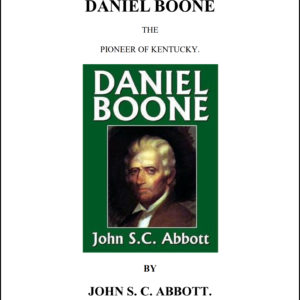 $2.50Buy Now
$2.50Buy NowDaniel Boone is regarded as the first real American folk hero. Without his cunning bravery, settlement west of the Appalachians may not have been made possible for years. Boone’s Wilderness Road, which is still used today, helped bridge the Cumberland Gap, granting access to the state of Kentucky from Pennsylvania.
Thanks to the writing of John S. C. Abbot, the life and genius of Boone can truly be appreciated through Daniel Boone: The Pioneer of Kentucky. Find out just how Boone crafted his Wilderness Trail, what he did to make it happen, and how he overcame the struggles of life in late eighteenth century America.

